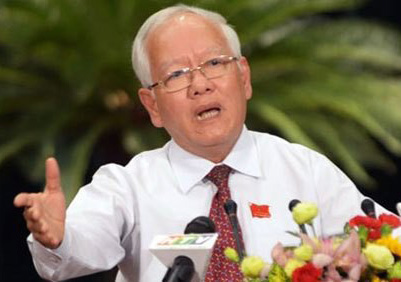HCMC – Ministry of Public Security investigators have concluded that former chairman of HCMC Le Hoang Quan was involved in a State-owned property mismanagement and property appropriation case and has proposed imposing an administrative sanction on him.
On September 11, the investigators suggested the Supreme People’s Procuracy prosecute former permanent vice chairman of the HCMC People’s Committee in the 2011-2015 tenure Nguyen Thanh Tai, deputy director of the HCMC Finance Department Tran Nam Trang, former director of the HCMC Department of Culture, Sports and Tourism Nguyen Thanh Rum, former director of the HCMC Light Music Center Vy Nhat Tao, former deputy heads of the HCMC government office Huynh Kim Phat and Le Van Thanh, former deputy director of the HCMC Department of Culture, Sports and Tourism Le Ton Thanh and former director of the HCMC Department of Natural Resources and Environment Dao Anh Kiet on charges of State-owned property mismanagement and a lack of responsibility that caused serious consequences based on article 2, clause 285 of the 1999 Penal Code.
They were involved in a case related to businesswoman Duong Thi Bach Diep, director of Diep Bach Duong Real Estate Co., Ltd., who was prosecuted for the fraudulent appropriation of property based on articles 4 and 5, clause 174, of the 2015 Penal Code.
Diep and Tao met in 2007 to discuss cooperation and the plan to renovate the headquarters of the HCMC Light Music Center, which was under the management of the HCMC Department of Culture, Sports and Tourism, at 185 Hai Ba Trung Street, HCMC.
Diep suggested that Diep Bach Duong Real Estate take over the 185 Hai Ba Trung land lot to build a hotel and restaurant complex. In exchange, the company would give the HCMC Light Music Center another land lot of an equivalent value and help the center build a new headquarters. Tao agreed with the deal.
In February 2008, Diep exchanged a land lot at 57 Cao Thang Street, District 3, for the 185 Hai Ba Trung location. Diep Bach Duong Real Estate would also give VND20 billion to the HCMC Light Music Center. She sent a document to the HCMC People’s Committee and relevant agencies asking for permission to execute the property swap.
Rum held a meeting gathering leaders of the HCMC Department of Culture, Sports and Tourism and they agreed with the deal.
Diep then met Tai to present the exchange plan and asked for permission. Tai consulted Quan and the latter agreed with the exchange. However, Quan said the exchange must be approved by the HCMC Department of Finance and Steering Committee 09 which is mandated to handle and rearrange State-owned land and housing in the city. Tai then assigned relevant agencies to get permission from the HCMC Department of Finance.
After the exchange was approved by the municipal authorities, Diep Bach Duong Real Estate took over the 185 Hai Ba Trung site but it did not hand over the 57 Cao Thang land lot to the HCMC Light Music Center. The company then asked the municipal authorities to cancel the exchange.
In January 2013, Quan chaired a meeting with the city’s vice chairmen and leaders of departments. At the meeting, Quan asked Diep Bach Duong Real Estate to submit more than VND4 billion of land use right variance and assigned the HCMC Department of Natural Resources and Environment to grant the land use right certificate for the 185 Hai Ba Trung land lot to Diep Bach Duong Real Estate.
After receiving the land use right certificate, Diep used it as collateral to borrow VND160 billion from the now-defunct Southern Bank. She also used the land use right certificate of the 57 Cao Thang land lot to borrow money from Agribank.
According to the Ministry of Public Security’s Investigative Police Agency, Diep provided false information to appropriate the 185 Hai Ba Trung land lot, while Quan believed that relevant agencies had checked and verified the information so he agreed with the property exchange between Diep Bach Duong Real Estate and the HCMC Light Music Center.
“Regarding this violation, Quan is partially responsible as leader of the city. His violation is not serious enough to be treated as a criminal offense. The Investigative Police Agency proposes imposing an administrative sanction,” the Investigative Police Agency concluded.









